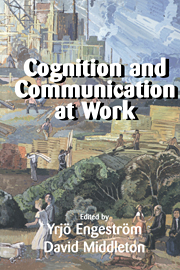Book contents
- Frontmatter
- Contents
- Contributors
- Acknowledgments
- 1 Introduction: Studying work as mindful practice
- 2 Distributed cognition in an airline cockpit
- 3 Constituting shared workspaces
- 4 Seeing as situated activity: Formulating planes
- 5 Convergent activities: Line control and passenger information on the London Underground
- 6 Users and designers in mutual activity: An analysis of cooperative activities in systems design
- 7 System disturbances as springboard for development of operators' expertise
- 8 Expert and novice differences in cognition and activity: A practical work activity
- 9 The tensions of judging: Handling cases of driving under the influence of alcohol in Finland and California
- 10 Talking work: Argument, common knowledge, and improvisation in teamwork
- 11 The collective construction of scientific genius
- 12 Experience and the collective nature of skill
- 13 Working together: Symbolic interactionism, activity theory, and information systems
- 14 On the ethnography of cooperative work
- Index
11 - The collective construction of scientific genius
Published online by Cambridge University Press: 05 June 2012
- Frontmatter
- Contents
- Contributors
- Acknowledgments
- 1 Introduction: Studying work as mindful practice
- 2 Distributed cognition in an airline cockpit
- 3 Constituting shared workspaces
- 4 Seeing as situated activity: Formulating planes
- 5 Convergent activities: Line control and passenger information on the London Underground
- 6 Users and designers in mutual activity: An analysis of cooperative activities in systems design
- 7 System disturbances as springboard for development of operators' expertise
- 8 Expert and novice differences in cognition and activity: A practical work activity
- 9 The tensions of judging: Handling cases of driving under the influence of alcohol in Finland and California
- 10 Talking work: Argument, common knowledge, and improvisation in teamwork
- 11 The collective construction of scientific genius
- 12 Experience and the collective nature of skill
- 13 Working together: Symbolic interactionism, activity theory, and information systems
- 14 On the ethnography of cooperative work
- Index
Summary
Issues of mind and rationality in science are routinely discussed by philosophers of science but not so often by social scientists studying the practice of scientists. There are obvious reasons for this. Mind and rationality as individual attributes seem particularly asocial, perhaps understandable through the tools of individualist psychology but not techniques developed for understanding the collective qualities of human life. Leigh Star has made an effort to look at how the construction of the brain as a site of mental activity is structured collectively by brain researchers, and students of cognition have considered how thought enters into the social processes of problem solving, but most work by social scientists has given secondary importance to mind and rationality as elements of science. Their work instead has focused on the social nature of knowledge, its character as part of the culture of human groups, not individual minds. Thinking that is not communicated to others cannot be science; it can be smart and observant about the natural world, but it cannot be part of science unless it enters the social world of scientists through some collectively understood medium. Similarly, the processes of determining the differences between good and bad science, whether the decision-making structures for making these assessments are rational or not, are fundamentally social activities; scientists will not usually begin to consider the epistemological standing of a scientific claim until is is claimed as scientific. and a tradition of knowledge.
- Type
- Chapter
- Information
- Cognition and Communication at Work , pp. 257 - 278Publisher: Cambridge University PressPrint publication year: 1996
- 7
- Cited by



